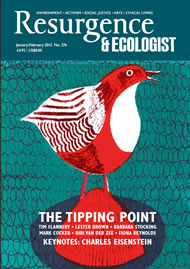We all know right from wrong and so what we must do now is as simple as doing the right thing
Caring for our environment is a moral imperative. At the moment everybody’s mind seems to be more exercised by the imperative of economic growth. Policymakers, politicians of every colour and journalists of almost all newspapers appear to be obsessed with economic growth.
The spectre of debt, deficit, recession and unemployment now hovers over much of the Western world. Caring for and protecting Nature is seen as a luxury for the good times. For the moment, concern for conservation is considered an impediment to economic growth. Therefore the environmental agenda has been pushed to the bottom.
The priority for politicians, industrialists and business leaders is to build more airports, more motorways, more high-speed railways, more office blocks and more housing estates.
This presents a great challenge to the ecologists and environmentalists. Our task now is to show that ecology and economy are not in contradiction with each other. Environment and employment can – and do – complement each other. You don’t have to be a genius to see that there must be a limit to the number of airports, motorways and business parks that can be built.
What will we do when we have covered all our land with concrete, all our fields and farms with industrial parks and shopping centres, and when we have cleared all our forests to make way for those airports, motorways and all the other urban developments?
Sooner or later we will reach saturation point.
Therefore we need to think of an economic system that is durable and sustainable. We need a system that will provide livelihood and wellbeing for all people, not just for the next five years, 56 years or even 500 years, but for the next five million years. In other words, for ever.
This means that, instead of a linear economy, we must think in terms of a cyclical one. If we base our economy on the health and wellbeing of our forests, they can provide our fruits, fibres and timber for evermore. If we protect our green fields, they will produce the food we need to feed ourselves until the end of time. If we harvest our energy from the sun, rain and wind – instead of from dwindling fossil fuels – we will never run out of renewable power.
If we utilise manual labour – human hands, arts, crafts and creativity – then our muscle power will remain inexhaustible.And of course, even with these natural resources, we must be careful to develop and maintain a human scale with zero waste and with unpolluting industries and technologies that exist to serve human needs.
If truth be told, the Western world is not in economic crisis. The banks have vast reserves of finance. The Bank of England has a staggering capacity to create quantitative easing. What we have lost is any skilful means of managing money.
Perhaps we have too much money and so no longer know how to count it, how to handle it, how to use it, how to distribute it. We are lost in a financial jungle but the Western world is not in economic crisis. The land is still producing food; the trees we have left are still producing apples, pears and plums. Olive trees have not stopped bearing olives; cows are not refusing to produce milk.
The problems of drought, floods and crop failure have all been caused by human-induced CO2 emissions leading to climatic calamities. So the answer is not more of the same old paradigm and more of the same industrial economy dependent on fossil fuels, but progress towards a natural, sustainable and low-carbon economy. And with this new perspective, the environment automatically becomes an economic imperative.
But if we continue to pollute, damage and destroy our environment we will end up causing an economic crisis of a scale we cannot even imagine.
The environment is more than an economic imperative. It is also a moral imperative. We, the present generation, have no right to take the forests, fields and fisheries from future generations. It is morally wrong to deprive our children and grandchildren of the security of natural resources.
No ethical standards would permit us to fill our oceans with plastics and our biosphere with carbon dioxide. And it is the moral responsibility of every generation to leave the land in as good a shape – if not better – than when we inherited it from our ancestors.
And I would say this moral imperative goes even further than our responsibility to coming generations. We have no moral right to impinge on the integrity of the biotic community. The human species is not the only species inhabiting the Earth, but due to our expanding industrial economy and its emphasis on unlimited economic growth we have been endangering the lives of millions of creatures, large and small.
Diminishing biodiversity through industrial and economic activity is wrong on both ethical and moral grounds.
And it is as simple as that.







